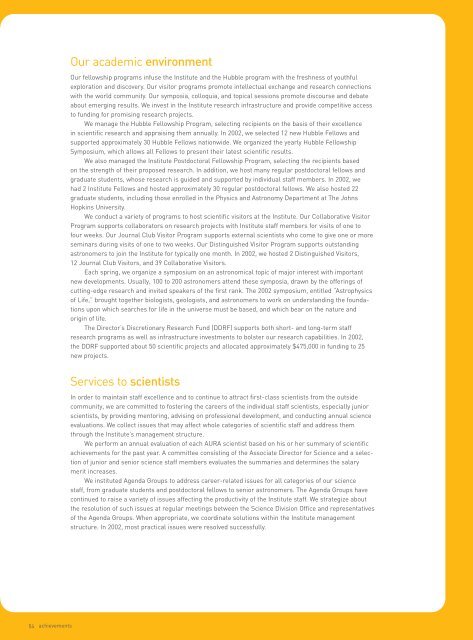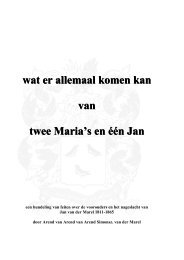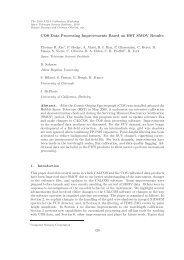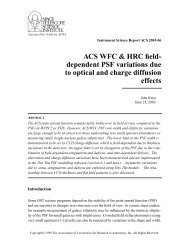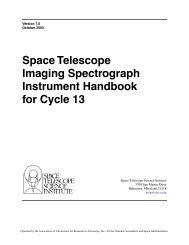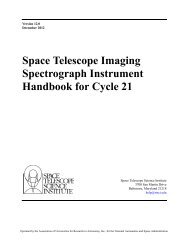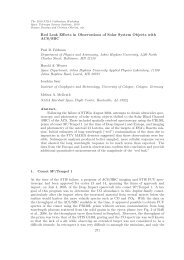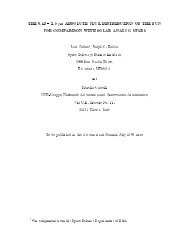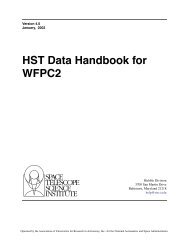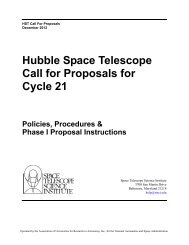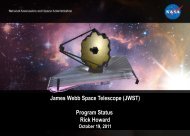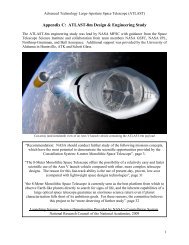STScI Annual Report 2002: A Living Mission
STScI Annual Report 2002: A Living Mission
STScI Annual Report 2002: A Living Mission
You also want an ePaper? Increase the reach of your titles
YUMPU automatically turns print PDFs into web optimized ePapers that Google loves.
54 achievements<br />
Our academic environment<br />
Our fellowship programs infuse the Institute and the Hubble program with the freshness of youthful<br />
exploration and discovery. Our visitor programs promote intellectual exchange and research connections<br />
with the world community. Our symposia, colloquia, and topical sessions promote discourse and debate<br />
about emerging results. We invest in the Institute research infrastructure and provide competitive access<br />
to funding for promising research projects.<br />
We manage the Hubble Fellowship Program, selecting recipients on the basis of their excellence<br />
in scientific research and appraising them annually. In <strong>2002</strong>, we selected 12 new Hubble Fellows and<br />
supported approximately 30 Hubble Fellows nationwide. We organized the yearly Hubble Fellowship<br />
Symposium, which allows all Fellows to present their latest scientific results.<br />
We also managed the Institute Postdoctoral Fellowship Program, selecting the recipients based<br />
on the strength of their proposed research. In addition, we host many regular postdoctoral fellows and<br />
graduate students, whose research is guided and supported by individual staff members. In <strong>2002</strong>, we<br />
had 2 Institute Fellows and hosted approximately 30 regular postdoctoral fellows. We also hosted 22<br />
graduate students, including those enrolled in the Physics and Astronomy Department at The Johns<br />
Hopkins University.<br />
We conduct a variety of programs to host scientific visitors at the Institute. Our Collaborative Visitor<br />
Program supports collaborators on research projects with Institute staff members for visits of one to<br />
four weeks. Our Journal Club Visitor Program supports external scientists who come to give one or more<br />
seminars during visits of one to two weeks. Our Distinguished Visitor Program supports outstanding<br />
astronomers to join the Institute for typically one month. In <strong>2002</strong>, we hosted 2 Distinguished Visitors,<br />
12 Journal Club Visitors, and 39 Collaborative Visitors.<br />
Each spring, we organize a symposium on an astronomical topic of major interest with important<br />
new developments. Usually, 100 to 200 astronomers attend these symposia, drawn by the offerings of<br />
cutting-edge research and invited speakers of the first rank. The <strong>2002</strong> symposium, entitled “Astrophysics<br />
of Life,” brought together biologists, geologists, and astronomers to work on understanding the foundations<br />
upon which searches for life in the universe must be based, and which bear on the nature and<br />
origin of life.<br />
The Director’s Discretionary Research Fund (DDRF) supports both short- and long-term staff<br />
research programs as well as infrastructure investments to bolster our research capabilities. In <strong>2002</strong>,<br />
the DDRF supported about 50 scientific projects and allocated approximately $475,000 in funding to 25<br />
new projects.<br />
Services to scientists<br />
In order to maintain staff excellence and to continue to attract first-class scientists from the outside<br />
community, we are committed to fostering the careers of the individual staff scientists, especially junior<br />
scientists, by providing mentoring, advising on professional development, and conducting annual science<br />
evaluations. We collect issues that may affect whole categories of scientific staff and address them<br />
through the Institute’s management structure.<br />
We perform an annual evaluation of each AURA scientist based on his or her summary of scientific<br />
achievements for the past year. A committee consisting of the Associate Director for Science and a selection<br />
of junior and senior science staff members evaluates the summaries and determines the salary<br />
merit increases.<br />
We instituted Agenda Groups to address career-related issues for all categories of our science<br />
staff, from graduate students and postdoctoral fellows to senior astronomers. The Agenda Groups have<br />
continued to raise a variety of issues affecting the productivity of the Institute staff. We strategize about<br />
the resolution of such issues at regular meetings between the Science Division Office and representatives<br />
of the Agenda Groups. When appropriate, we coordinate solutions within the Institute management<br />
structure. In <strong>2002</strong>, most practical issues were resolved successfully.


